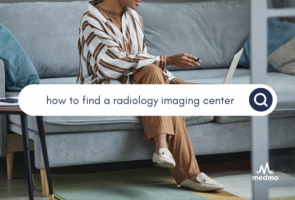
10 Things You Should Know About CT Scans
A CT scan, also known as a CAT scan, provides detailed pictures of your internal organs, muscles, and bones. Doctors use CT scans to diagnose diseases and to monitor the effect of treatments. If you’re scheduled to have one, here’s a quick guide to what you’ll need to know.
CT scans are performed in hospitals, outpatient imaging centers, or medical offices. The price of a CT scan can vary by thousands of dollars, so it pays to be an informed patient. By using Medmo, you can book any type of CT scan and set the exact price you can afford.
-
What are common reasons to need a CT scan?
A CT scan can be used to examine any part of the body. Most often, however, doctors order CT scans to check the following areas:
- Brain, for signs of a stroke, tumor, or bleeding
- Lungs, for infection, blood clots, tumors, and other diseases (e.g., interstitial lung disease)
- Intestines, for blockages and inflammation (like from infection)
- Liver, for tumors and evidence of cirrhosis (advanced liver disease)
- Pancreas, for tumors and conditions like pancreatitis (inflammation)
- Kidneys, for stones, cysts, blockages, and tumors
- Pelvis, for infection, obstruction, or other abnormalities of the urinary and reproductive organs (like the bladder, ovaries, uterus, and prostate)
-
How much does an CT scan usually cost?
The price of a CT scan can range from $300 to several thousand dollars. Centers usually will not perform a CT scan for less than $300; however, if you are available during off-hours or on short notice, you may secure a lower price. By booking with Medmo, you can ensure your scan is booked at the exact price you can afford.
-
How long should a CT scan take?
A CT scan typically lasts 15-30 minutes. Plan to be at the imaging center for at least one hour. If you need oral contrast for your scan, arrive an hour early to pick it up and start drinking.
-
How does a CT scan work?
CT, short for computed tomography, is a type of medical scan in which X-rays are sent through the body at multiple different angles. Different parts of the body block X-rays by different amounts. Therefore, by measuring the strength of the x-rays after they have passed through your body, a computer can construct a three-dimensional picture of your organs.
-
Is a CT scan the same as a CAT scan?
Yes. CAT scan is simply another name for CT scan, and stands for computed axial tomography (instead of computed tomography).
-
What is CT contrast? Is it safe?
Sometimes doctors administer iodinated contrast during a scan to better define certain structures and increase the odds of seeing certain abnormalities, such as tumors or blood clots. This medication can be consumed as a drink (if the doctors want to examine the stomach and intestines) or given through an IV.
Iodinated contrast is generally considered safe unless you have had an allergic reaction or you have chronic kidney disease.
If you have had an allergic reaction to iodinated contrast, your doctor will order your test without contrast, order a different kind of test (like an MRI), or administer medications before your test (such as steroids) to reduce the likelihood of a repeat reaction. A history of shellfish allergy does not increase the chances of a contrast allergy.
If you have chronic kidney disease, you will need to provide a recent measurement of your serum creatinine concentration (a marker of kidney function). Many imaging centers can perform these measurements right before your scan. People with kidney disease cannot safely receive iodinated contrast, since it can worsen kidney dysfunction.
People with normal kidneys also face some risk of kidney dysfunction after receiving iodinated contrast. About one in 100-200 people are affected – meaning the risk is 0.5 – 1.0%. The risk is higher among those who are ill, dehydrated, and/or elderly. The kidney dysfunction is often temporary but may be permanent.
-
What happens during the CT scan?
You will lie down on a bed, which slides into a short imaging tube. If you need intravenous contrast, the technologist will administer it a few seconds before the scan begins. You may need to hold your breath for ten to fifteen seconds during your scan.
-
Is CT safe? Isn’t there radiation?
A CT scan is a low-risk test. The major safety issues are the small amount of radiation and the risk of kidney dysfunction associated with intravenous contrast (as described above).
The radiation associated with x-rays can damage DNA and increase the risk of cancer. Each CT scan raises your lifetime risk of cancer by approximately 0.05%. The risk is greatest among younger people. As a result, CT scans are generally avoided in those under age 20-30, and used with caution in those aged 30 to 50.
In most cases, however, the immediate diagnostic benefits of a CT scan outweigh the theoretical long-term cancer risk. Nonetheless, you should still avoid unnecessary scans and not have repeat scans more often than recommended in official medical guidelines.
-
Can I have a CT scan if I have a pacemaker or other implanted device?
Yes. Unlike with MRI, there is no risk associated with metal implants.
-
Do I need to do anything to prepare for my CT scan?
Usually no specific preparation is required before a CT scan, but you should call the imaging center to confirm.
If you need iodinated contrast and take metformin for diabetes, doctors usually recommend holding your dose for two or three days, starting the morning of your scan. (There is a small risk of a serious complication, known as lactic acidosis, in people who take metformin and experience contrast-related kidney dysfunction.)
If you need oral contrast, you should drink it one to two hours before your test.
To book a scan, visit us at Medmo.com. Medmo helps people schedule radiology imaging tests – such as MRI, CT scans, PET, and more – at nearby accredited centers and identify the payment solution that works best for them.
Ready to get started?
Here’s what you’ll need to schedule an appointment
1. Imaging referral / prescription
2. Your contact information
3. Insurance OR card information


